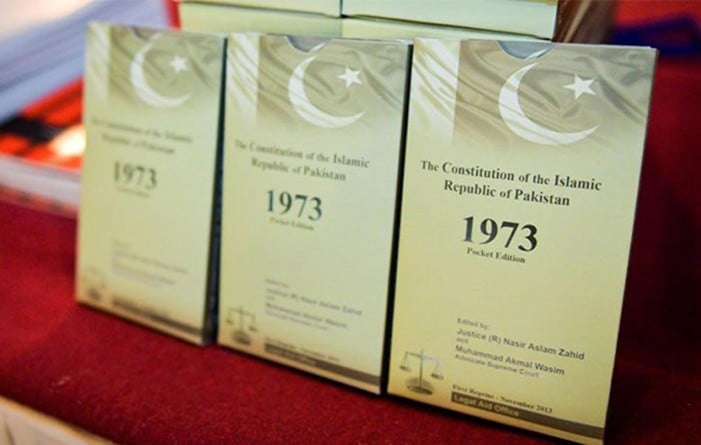
Critics of the 18th Amendment do not approve of a reduced share of the federal government in the national divisible pool of the NFC

The form of the future Constitution should be federal with the residuary powers vested in the provinces.
A uniform measure of autonomy shall be granted to all provinces.
(Two of the 14 points of Muslim League in 1929)
"No constitutional plan would be workable or acceptable to the Muslims unless geographical contiguous units are demarcated into regions which would be so constituted with such territorial readjustments as may be necessary. That the areas in which the Muslims are numerically in majority as in the North-Western and Eastern zones of India should be grouped to constitute independent states in which the constituent units shall be autonomous and sovereign"
(Lahore Resolution, 1940)
In a meeting on June 23, 1947, when the then chief of Indian Army, General Sir RM Lockhart, asked Jinnah about the future Muslim League’s policies, Jinnah told him: ‘except for defence, foreign affairs and communications and perhaps one or two other subjects common to all provinces which would be controlled from the centre, provinces would have complete provincial autonomy.’
(What’s Wrong With Pakistan, Hay House India, 2013)
But notwithstanding the above, the leadership betrayed these basic objectives and denied provincial autonomy to the provinces that constituted Pakistan. However, after 63 years the country moved constitutionally towards the promised objectives by passing the 18th Amendment, which was considered the major gain of democratic forces. But once again, there is a strong lobby which wants to roll back the progress made in this direction.
Actually, the pro-strong Centre lobbies are agitated more by the reduction in the share of the federal government in the national divisible pool, which was reduced from over 50 per cent previously to 42.5 per cent in the current seventh NFC Award.
The 18th Amendment gives protection to the provincial shares by stipulating in Article 160 (3) (a) of the Constitution that "the share of the Provinces in each Award of National Finance Commission shall not be less than the share given to the Provinces in the previous Award."
The critics of the 18th Amendment have a major issue with this clause as it does not allow enhancing the share in the national divisible pool for the federal government. They are feeling constrained because a bulk of this money goes to finance over the Rs1 trillion defence budget. This Rs1 trillion amount does not include the pensions of the retired armed forces personnel which were quietly parked in the overall budget of the federal government during Musharraf’s era. It also does not include the expenditure on making bombs and missiles, an amount usually hidden in civilian expenditures.
The other big share goes to debt-servicing which is over Rs1.6 trillion (more than 30 per cent of the federal budget) and this is expected to rise in the current year.
Perhaps instead of trying to mess with the protection given by the 18th Amendment to the provinces’ share, the only way the Centre can increase its share is by collecting more revenue.
The provinces have their own complaints about non-implementation of the 18th Amendment in letter and spirit. For instance, Article 158 provided that the provinces producing oil and gas would have the first right to use it but this is not being done. Otherwise, Balochistan and Sindh -- which have vast resources of natural gas -- would not be begging for a larger share in the country’s gas resources.
The provinces criticise the federal government for not holding Council of Common Interest’s meetings as stipulated in the constitution and maintain that the CCI does not have a secretariat which could follow on the implementation of the issues that are decided in this august forum which has representation of all the four chief ministers and the prime minister.
Another complain of the provinces is that the Executive Committee of the National Economic Council (ECNEC) is not held where the provinces can give their input regarding the public sector projects.
Now the issue has been raised that there should be one curriculum throughout the country and while this responsibility was devolved to the provinces in the 18th Amendment, the champions of uniform syllabus are, indeed, not worried about the natural sciences curriculum because they cannot be different from province to province. Their major worry is the subject of Pakistan Studies which is compulsory in all schools and colleges. It teaches a biased history of Pakistan and does not cover the long political struggle of the democratic forces in Pakistan.
For instance, a major setback for Pakistan was its separation from East Pakistan, now Bangladesh, which was mistreated for 24 years by West Pakistan. The whole subject is dismissed in just a couple of paragraphs in the Pakistan Studies prescribed textbooks.
Perfidiously, the learned critics of the 18th Amendment are now saying that it was passed in haste by the Parliament. They know full well that the parliamentary committee to amend the Constitution held more than 200 meetings in nine months. The public opinion was solicited by an advertisement in newspapers that anybody could suggest an amendment they deem fit to the Constitution.
Also read: Problems on ground
Also, the bar councils were requested to suggest amendments to the Constitution. As a result of this exercise, more than 900 amendments were suggested by the public and bar councils.
The parliamentarians’ committee had 16 members representing all the political parties in the Parliament. These parties, in turn, were asked to get the proposed draft of the 18th Amendment ratified by their own parties. Hence, the learned critics saying that it was steam-rolled through the Parliament in just two days are either ignorant or are serving the vested interests.
The critics should realise that in Pakistan, constitution-making has remained mired by the provincial autonomy issue. Instead of criticising it, they should push for its implementation to strengthen the federation.